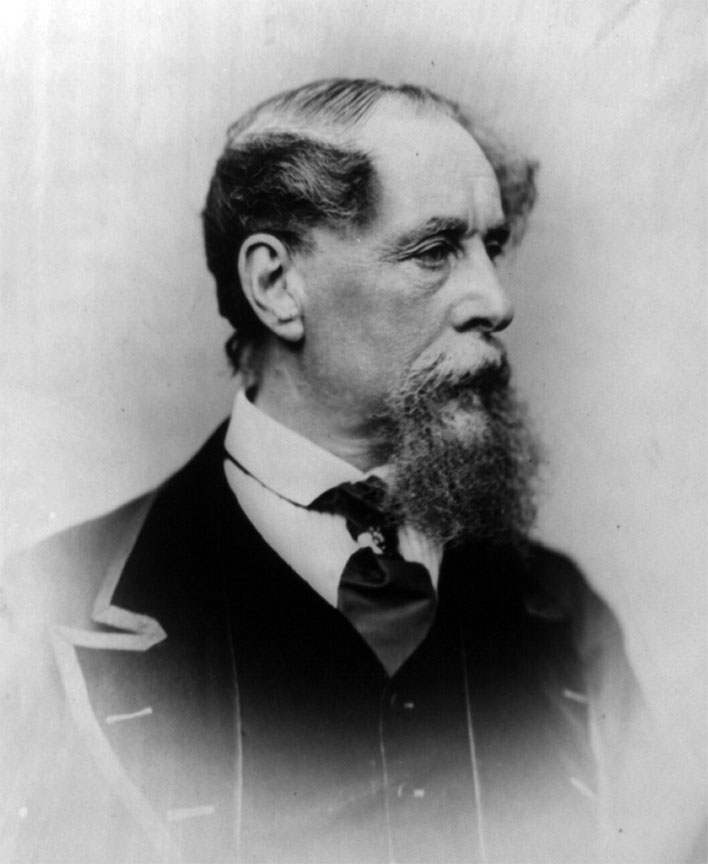
This giant of English literature is known for his many immortal works including Oliver Twist, Pickwick Papers, Nicholas Nickleby, A Christmas Carol, Bleak house, David Copperfield, A Tale of Two Cities, and Great Expectations. Dickens was popular on both sides of the Atlantic, and he spent considerable time abroad in the United States, Switzerland, and Italy. In addition to his novels, Dickens' prodigious literary output included letters, pamphlets, plays, and short stories. He also delivered speeches, conducted private theatrical productions, and ran several popular magazines. Only 58 years old at his death, Dickens is buried in Westminster Abbey..
Charles Dickens, born on February 7, 1812, in Portsmouth, England, is one of the most celebrated authors in English literature. Known for his vivid characters, social commentary, and masterful storytelling, Dickens’s works have left an indelible mark on the literary world and continue to be cherished by readers across the globe.
Dickens's early life was marked by hardship. His father, John Dickens, worked as a clerk in the Navy Pay Office but was often in debt. This financial instability led to the family's relocation to London when Charles was just a boy. The family's struggles culminated in 1824 when John Dickens was imprisoned for debt. At the tender age of 12, Charles was forced to leave school and work at Warren's Blacking Factory, where he pasted labels on shoe polish bottles. This experience left a profound impact on him, and themes of poverty, injustice, and social reform would later pervade his writings.
Despite these early challenges, Dickens managed to resume his education after his father was released from prison. He eventually found work as a law clerk, then as a court reporter, and later as a journalist. His keen observation of the world around him, combined with his growing writing skills, laid the foundation for his literary career. In 1836, Dickens published his first novel, "The Pickwick Papers," which was serialized in monthly installments. The humorous and lively tale quickly became a sensation, establishing Dickens as a popular writer.
Following the success of "The Pickwick Papers," Dickens continued to write prolifically, producing some of the most enduring works of English literature. His novels, such as "Oliver Twist," "David Copperfield," "Bleak House," "A Tale of Two Cities," and "Great Expectations," are renowned for their complex characters, intricate plots, and biting social commentary. Dickens had a unique ability to create memorable characters, from the cunning Fagin and the despicable Ebenezer Scrooge to the virtuous Pip and the tragic Little Nell. These characters, often larger than life, were used by Dickens to explore themes of morality, social justice, and the human condition.
Dickens was also deeply concerned with the social issues of his time. His works often highlighted the stark contrasts between the rich and the poor, the powerful and the powerless. He used his novels to expose the harsh realities of life for the working class, the plight of orphans, the inhumane conditions in workhouses, and the corruption within the legal system. Through his vivid portrayals of Victorian England, Dickens became a powerful voice for social reform, advocating for the rights and dignity of the underprivileged.
In addition to his novels, Dickens was also a gifted public speaker and performer. He embarked on several reading tours, both in Britain and the United States, where he captivated audiences with dramatic readings of his works. His popularity during his lifetime was immense, and he became one of the most famous authors of his era.
Charles Dickens passed away on June 9, 1870, at the age of 58, leaving behind a literary legacy that continues to influence writers and readers alike. His works remain relevant today, offering timeless insights into the human experience and the social issues that still resonate in modern society. Dickens's ability to combine compelling storytelling with a deep sense of social justice has ensured his place as one of the greatest writers in history.
 >
>